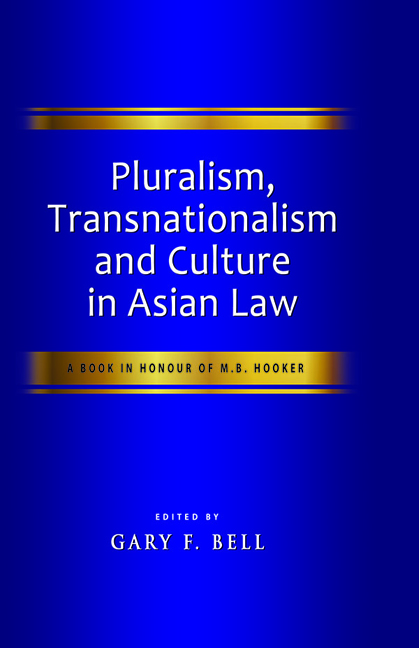Book contents
- Frontmatter
- Dedication
- Contents
- Preface
- Acknowledgements
- About the Contributors
- Chapter 1 M.B. Hooker and Southeast Asian Law: Path-breaking Passions
- Chapter 2 Asian Thought and Legal Diversity
- Chapter 3 Comparative Law, Anti-Essentialism and Intersectionality: Reflections from Southeast Asia in Search of an Elusive Balance
- Chapter 4 Legal Pluralism and Legal Anthropology: Experiences from Indonesia
- Chapter 5 Mapping the Relationship of Competing Legal Traditions in the Era of Transnationalism in Indonesia
- Chapter 6 Indonesia's Weak State Courts and Weak Law Fare Poorly in a Pluralist Commercial World
- Chapter 7 When Laws Are Not Enough: Ethics, Aesthetics, and Intra-Religious Pluralism in Contemporary Indonesia
- Chapter 8 Legal Pluralism and the Constitutional Position of East Malaysia's Indigenous Peoples: The View from the Longhouse
- Chapter 9 Sharia, State and Legal Pluralism in Indonesia: How Law Can You Go?
- Chapter 10 Negotiating Legal Pluralism in Court: Fatwa and the Crime of Blasphemy in Indonesia
- Chapter 11 Islamic Law in Israel: A Case Study in Legal Pluralism
- Chapter 12 The Road to Democracy Goes Through Religious Pluralism: The Indonesian Case and Thoughts on Post-Mubarak Egypt
Chapter 8 - Legal Pluralism and the Constitutional Position of East Malaysia's Indigenous Peoples: The View from the Longhouse
Published online by Cambridge University Press: 12 January 2018
- Frontmatter
- Dedication
- Contents
- Preface
- Acknowledgements
- About the Contributors
- Chapter 1 M.B. Hooker and Southeast Asian Law: Path-breaking Passions
- Chapter 2 Asian Thought and Legal Diversity
- Chapter 3 Comparative Law, Anti-Essentialism and Intersectionality: Reflections from Southeast Asia in Search of an Elusive Balance
- Chapter 4 Legal Pluralism and Legal Anthropology: Experiences from Indonesia
- Chapter 5 Mapping the Relationship of Competing Legal Traditions in the Era of Transnationalism in Indonesia
- Chapter 6 Indonesia's Weak State Courts and Weak Law Fare Poorly in a Pluralist Commercial World
- Chapter 7 When Laws Are Not Enough: Ethics, Aesthetics, and Intra-Religious Pluralism in Contemporary Indonesia
- Chapter 8 Legal Pluralism and the Constitutional Position of East Malaysia's Indigenous Peoples: The View from the Longhouse
- Chapter 9 Sharia, State and Legal Pluralism in Indonesia: How Law Can You Go?
- Chapter 10 Negotiating Legal Pluralism in Court: Fatwa and the Crime of Blasphemy in Indonesia
- Chapter 11 Islamic Law in Israel: A Case Study in Legal Pluralism
- Chapter 12 The Road to Democracy Goes Through Religious Pluralism: The Indonesian Case and Thoughts on Post-Mubarak Egypt
Summary
Malaysian Constitutionalism and the Indigenous Peoples
With increasing awareness of, and concern about, the legal position of indigenous peoples across the world, there is naturally increasing attention to the ways in which this position is affected by constitutional provisions. These days the concern also embraces the fact that indigenous peoples have their own legal traditions, or forms of “chthonic law” as Patrick Glenn has it.1 John Borrows, for example, in his book Canada's Indigenous Constitution, argues for the inclusion of indigenous law within the recognized legal traditions of Canada, and for this law to be taken seriously on its own terms, as well as protected by the Constitution. Hooker, in his extensive work on the indigenous peoples of East Malaysia (Sabah and Sarawak), was concerned with the adat of these states’ indigenous people. His work explores the nature and the detail of this law as it has been enforced in the courts in Sabah and Sarawak as an aspect of official or formal legal pluralism.
The intention in this chapter is not to explore this further or to distil anything of relevance to legal pluralism directly from Hooker's work; it is rather to explore the extent to which it is possible to assert that this pluralism has been constitutionalized — in other words, to inquire into its constitutional status within the Malaysian federation. However, in building on Hooker's extraordinary foundation of knowledge and understanding of adat, we should not ignore, as an aspect of legal pluralism, the relevance here also of how constitutionalism frames, recognizes, embraces or responds not just to the laws but also to the protection of the rights and interests, of indigenous people. The issue of recognition as such of adat, or what in relation to East Malaysia is known as “native law”, is relatively unproblematical, due to the prevailing legal pluralism in the legal systems of Sabah and Sarawak. The issue is therefore how far this recognition of legal pluralism is constitutionalized, and how far federalism, which was designed (in relation to Sabah and Sarawak under the Malaysia Agreement of 1963) to protect the rights of the indigenous people, has succeeded in doing so.
- Type
- Chapter
- Information
- Pluralism, Transnationalism and Culture in Asian LawA Book in Honour of M.B. Hooker, pp. 178 - 207Publisher: ISEAS–Yusof Ishak InstitutePrint publication year: 2017

